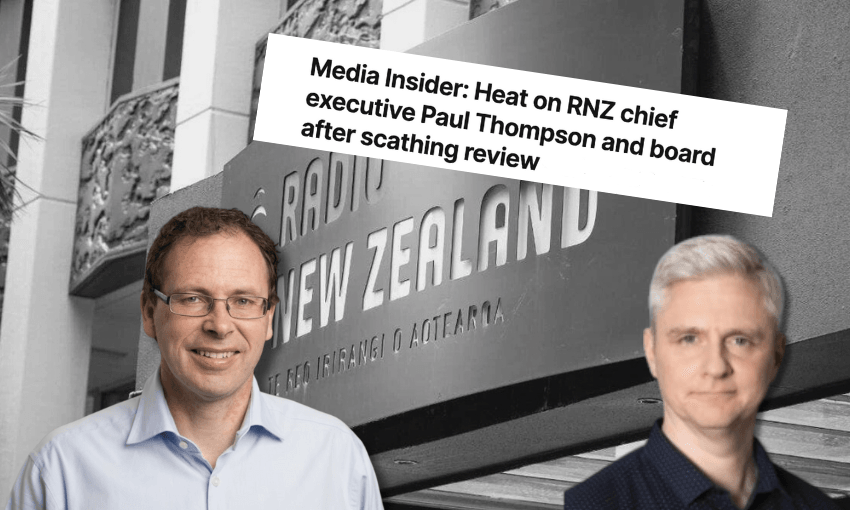A scathing external review into RNZ’s declining audience suggests drastic changes are needed. Radio veteran Bill Kerton wonders if it’s too little, too late.
Five years ago, at the dawn of RNZ’s radio audience decline, I submitted an idea published on this very platform about the station running a limited advertising schedule.
Evidently my blithe and entirely unsolicited proposal was not well-received. Re-reading it, the foolish implication was that RNZ is not sacrosanct.
I was reminded of RNZ recently while using an A3 envelope when all I really needed was a letter-sized one. My current view is that the entire state broadcasting apparatus is confused and oversized. I don’t reach this radical conclusion lightly. A habit of constantly reading, watching, listening but mostly canvassing public opinion over my 40-year career tells me all I need to know.
So why did I get a strange sense of inevitability while reading the Shayne Currie’s Herald article about former RNZ news boss Richard Sutherland’s report into RNZ’s radio failings?
His concerns bore a striking resemblance to the ones I raised with broadcasting minister, Paul Goldsmith, in November 2024 at a private meeting, and in a couple of emails since, about the state of public broadcasting.
Me, November 2024: “My view is that durable, structural change…is overdue… re-programming of assets to deliver a more mainstream cultural and… financial dividend.”
Sutherland, in his review: “an audit of all RNZ National presenters is urgently needed” and “RNZ suffers from a lack of audience clarity, internal cohesion and urgency… without a clear understanding of who they’re speaking to.”
Two opinions with some similarities. So what?
Well, in a second Currie analysis there was this missive from RNZ on the report, which seems… defiant. “Not every suggestion or recommendation in the advice will be implemented. It represents one view of the strengths and weaknesses of RNZ National and suggested changes.”
Good deflection. But in RNZ’s defence, it really is a tremendous bore to be told what to do all the time – especially by a bloke they may have thought of as a comrade. Unfortunately, when the paymaster is a new government with less than no money, there are few options aside from delay tactics – which I’m not accusing anyone of. Yet.
RNZ CEO Paul Thompson. Photo: Supplied
So what to make of Sutherland’s clear radio operational recommendations? They’re not particularly outrageous or unachievable – especially with an executive of (until recently) nine, and an unknown number of departmental managers. Radio is renowned for its plasticity, arguably its best feature.
It won’t be a pleasant task, but broad changes in tone, perceived progressive bias, presenters, shows, target demos and more could easily be hashed out this weekend and executed well before Christmas. Does its charter need refreshing? RNZ will already know who’s performing and who isn’t.
If the above timeframe sounds absurd, it isn’t.
I was only 27 when I had to juggle an arguably hotter political potato after being made programme director at 95bFM in 1995. We had a charter too. The expectation was increasing audience share. It always is. With a complement of at least 100 staff, volunteers and presenters (the latter mostly unpaid and naturally resistant to change), few resources, no audience research, analogue tech and an expectation to keep the general tone intact, it was a challenge.
I focused on replacing shows that weren’t popular with ones I knew would be, moved people around, formalised the playlist and most importantly, hired a “get” (Mikey Havoc, for breakfast, to “win the day”). An ambitious hire is incidentally one of the key recommendations in the Sutherland report.
Within six months our 10+ audience share increased from 2.5% to 4.4%. I put this largely down to the magic of the right people in the right place at the right time, but it was also a board and management that didn’t force me to endlessly consult and justify my decisions.
Yes, there are myriad new competitive factors to contend with nowadays, but on the upside, nobody reads books. To quote my former 95bFM colleague Bob Kerrigan, “The job is not to bemoan the times, it is to create the times.”
And so back to a beleaguered RNZ. This note sent by RNZ CEO Paul Thompson to Sutherland prior to commissioning the report caught my attention. “We will be undertaking a major reset of the station and our approach to live audio; I am seeking your independent, frank guidance on how best to do this.”
I had to re-read that note. Where was RNZ’s chief strategy officer? Busy doing what?
A CEO of a commercial radio station (with a guaranteed income of over $60 million) paying a third party for frank advice that they, or their large executive staff need to know instinctively, well down the track of a sustained audience decline, would surely be looking at early retirement. Why should RNZ be any different?
Maybe the Sutherland report is a stalking horse so those wielding the axe can say “he told me to” but there is much more afoot than simply moving a few things around and trying to hire Jack Tame.
What will the current National-led administration do, if RNZ’s radio decline isn’t arrested in very short order? At least one coalition partner would probably close the entire operation down. A $30,000 report into a massively over-resourced government asset that Thompson’s office cleaner might have summarised in a few sentences is exactly what New Zealanders are utterly sick of reading about.
But RNZ has a cunning plan – to hire a “chief audio officer”. To the successful candidate I have one piece of advice: make 100% sure you can do what it is you’re being hired to do. Get the numbers and a knife on day one. I wish you and everyone at RNZ all the very best.

